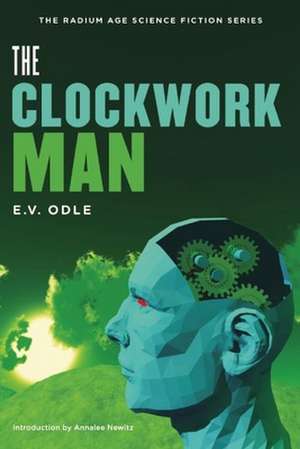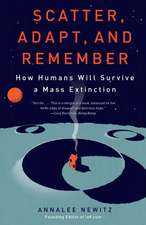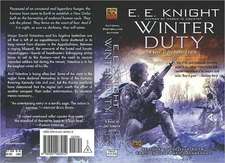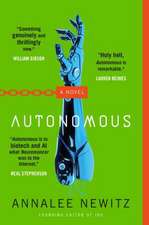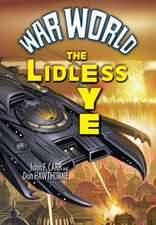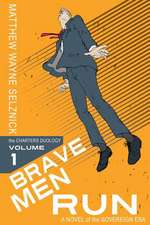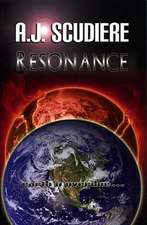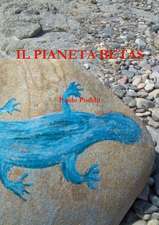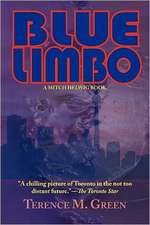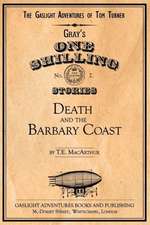The Clockwork Man: The Radium Age Science Fiction Series
Autor Edwin Vincent Odle, Annalee Newitzen Limba Engleză Paperback – 2 sep 2013
Several thousand years from now, advanced humanoids known as the Makers will implant clockwork devices into our heads. At the cost of a certain amount of agency, these devices will permit us to move unhindered through time and space, and to live complacent, well-regulated lives. However, when one of these devices goes awry, a "clockwork man" appears accidentally in the 1920s, at a cricket match in a small English village. Comical yet mind-blowing hijinks ensue.
Considered the first cyborg novel, The Clockwork Man was first published in 1923 — the same year as Karel Capek's pioneering android play, R.U.R.
Considered the first cyborg novel, The Clockwork Man was first published in 1923 — the same year as Karel Capek's pioneering android play, R.U.R.
Preț: 74.21 lei
Nou
Puncte Express: 111
Preț estimativ în valută:
14.20€ • 15.47$ • 11.97£
14.20€ • 15.47$ • 11.97£
Carte tipărită la comandă
Livrare economică 23 aprilie-07 mai
Preluare comenzi: 021 569.72.76
Specificații
ISBN-13: 9781935869634
ISBN-10: 1935869639
Pagini: 144
Dimensiuni: 127 x 188 x 13 mm
Greutate: 0.18 kg
Editura: Hilobooks
Seriile The Radium Age Science Fiction Series, Radium Age Science Fiction
ISBN-10: 1935869639
Pagini: 144
Dimensiuni: 127 x 188 x 13 mm
Greutate: 0.18 kg
Editura: Hilobooks
Seriile The Radium Age Science Fiction Series, Radium Age Science Fiction
Cuprins
Chapter 1: The Coming of the Clockwork Man
Chapter 2: The Wonderful Cricketer
Chapter 3: The Mystery of the Clockwork Man
Chapter 4: Arthur Withers Thinks Things Out
Chapter 5: The Clockwork Man Investigates Matter
Chapter 6: “It was not so, it is not so, and, indeed,God forbid it should be so.”
Chapter 7: The Clockwork Man Explains Himself
Chapter 8: The Clock
Chapter 9: Gregg
Chapter 10: Last Appearance of the Clockwork Man
Chapter 2: The Wonderful Cricketer
Chapter 3: The Mystery of the Clockwork Man
Chapter 4: Arthur Withers Thinks Things Out
Chapter 5: The Clockwork Man Investigates Matter
Chapter 6: “It was not so, it is not so, and, indeed,God forbid it should be so.”
Chapter 7: The Clockwork Man Explains Himself
Chapter 8: The Clock
Chapter 9: Gregg
Chapter 10: Last Appearance of the Clockwork Man
Recenzii
"Edwin Vincent Odle's ominous, droll, and unforgettable THE CLOCKWORK MAN is a missing link between Lewis Carroll and John Sladek or Philip K. Dick. Considered with them, it suggests an alternate lineage for SF, springing as much from G.K. Chesterton's sensibility as from H.G. Wells's." — Jonathan Lethem (2013)
"This is still one of the most eloquent pleas for the rejection of the 'rational' future and the conservation of the humanity of man. Of the many works of scientific romance that have fallen into utter obscurity, this is perhaps the one which most deserves rescue." — Brian Stableford
"Perhaps the outstanding scientific romance of the 1920s." — Anatomy of Wonder
"Edwin Vincent Odle's ominous, droll, and unforgettable THE CLOCKWORK MAN is a missing link between Lewis Carroll and John Sladek or Philip K. Dick. Considered with them, it suggests an alternate lineage for SF, springing as much from G.K. Chesterton's sensibility as from H.G. Wells's." -- Jonathan Lethem (2013)"This is still one of the most eloquent pleas for the rejection of the 'rational' future and the conservation of the humanity of man. Of the many works of scientific romance that have fallen into utter obscurity, this is perhaps the one which most deserves rescue." -- Brian Stableford"Perhaps the outstanding scientific romance of the 1920s." -- "Anatomy of Wonder"
Notă biografică
Edwin Vincent Odle (1890–1942) was founding editor of the British short-story magazine Argosy, and a member of avant-garde author Dorothy Richardson's circle. Odle's only other science fiction novel was never published, and is now lost.
Annalee Newitz is editor-in-chief of the science fiction and science blog io9. She's the author of Scatter, Adapt, and Remember: How Humans Will Survive a Mass Extinction (2013) and Pretend We're Dead: Capitalist Monsters in American Pop Culture (2006).
Annalee Newitz is editor-in-chief of the science fiction and science blog io9. She's the author of Scatter, Adapt, and Remember: How Humans Will Survive a Mass Extinction (2013) and Pretend We're Dead: Capitalist Monsters in American Pop Culture (2006).
Extras
Arthur’s chief sensation was one of pity for a fellow creature obviously in such hopeless state. He almost forgot his alarm in his sympathy for the difficulties of the strange figure. That struggle to get alive, to produce the elementary effects of existence, made him think of his own moods of failure, his own helplessness. He took a step nearer to the hurdle.
“Can I do anything for you?” he enquired, almost in a whisper. Suddenly, the strange figure seemed to achieve a sort of mastery of himself. He began opening and shutting his mouth very rapidly, to the accompaniment of sharp clicking noises.
“Its devilish hard,” he announced, presently, “this feeling, you know—Click—All dressed up and nowhere to go—Click—Click—”
“Is that how you feel? Arthur enquired. He came nearer still, as though to hear better. But the other got into a muddle with his affirmative. He flapped an ear in staccato fashion, and Arthur hastily withdrew.
Now, the afternoon was very warm and very still. Where they stood the only sounds that could reach them were the slight crack of the batted ball, and the soft padding of the fielders. That was why the thing that happened next could hardly be mistaken. It began by the strange figure suddenly putting both hands upon the hurdle and raising himself up about an inch off the ground. He looked all at once enormously alive and vital. Light flashed in his eyes.
“Eureka!” he clicked, “I’m working!”
“What’s that?” shouted Arthur, backing away. “What’s that you said?”
“L-L-L-L-L-L-Listen,” vibrated the other.
Still pressing his hands on the hurdle, he leaned upon them until the top part of his body hung perilously over. His face wore an expression of unutterable relief.
“Can’t you hear,” he squeaked, red in the face.
And then Arthur was quite sure about something that he had been vaguely hearing for some moments. It sounded like about a hundred alarum clocks all going off at once, muffled somehow, but concentrated. It was a sort of whirring, low and spasmodic at first, but broadening out into something more regular, less frantic.
“What that noise?” he demanded thoroughly frightened by now.
“It’s only my clock,” said the other. He clambered over the hurdle, a little stiffly, as though not quite sure of his limbs. Except for a general awkwardness, an abrupt tremor now and again, he seemed to have become quite rational and ordinary. Arthur scarcely comprehended the remark, and it certainly did not explain the origin of the harassing noise. He gaped at the figure—less strange now, although still puzzling—and noticed for the first time his snuff coloured suit of rather odd pattern, his boots of curious leaden hue, his podgy face with a snub nose in the middle of it, his broad forehead surmounted by the funny fringe of the wig. His voice, as he went on speaking, gradually increased in pitch until it reached an even tenor.
“Perhaps I ought to explain,” he continued. “You see, I’m a clockwork man.”
“Can I do anything for you?” he enquired, almost in a whisper. Suddenly, the strange figure seemed to achieve a sort of mastery of himself. He began opening and shutting his mouth very rapidly, to the accompaniment of sharp clicking noises.
“Its devilish hard,” he announced, presently, “this feeling, you know—Click—All dressed up and nowhere to go—Click—Click—”
“Is that how you feel? Arthur enquired. He came nearer still, as though to hear better. But the other got into a muddle with his affirmative. He flapped an ear in staccato fashion, and Arthur hastily withdrew.
Now, the afternoon was very warm and very still. Where they stood the only sounds that could reach them were the slight crack of the batted ball, and the soft padding of the fielders. That was why the thing that happened next could hardly be mistaken. It began by the strange figure suddenly putting both hands upon the hurdle and raising himself up about an inch off the ground. He looked all at once enormously alive and vital. Light flashed in his eyes.
“Eureka!” he clicked, “I’m working!”
“What’s that?” shouted Arthur, backing away. “What’s that you said?”
“L-L-L-L-L-L-Listen,” vibrated the other.
Still pressing his hands on the hurdle, he leaned upon them until the top part of his body hung perilously over. His face wore an expression of unutterable relief.
“Can’t you hear,” he squeaked, red in the face.
And then Arthur was quite sure about something that he had been vaguely hearing for some moments. It sounded like about a hundred alarum clocks all going off at once, muffled somehow, but concentrated. It was a sort of whirring, low and spasmodic at first, but broadening out into something more regular, less frantic.
“What that noise?” he demanded thoroughly frightened by now.
“It’s only my clock,” said the other. He clambered over the hurdle, a little stiffly, as though not quite sure of his limbs. Except for a general awkwardness, an abrupt tremor now and again, he seemed to have become quite rational and ordinary. Arthur scarcely comprehended the remark, and it certainly did not explain the origin of the harassing noise. He gaped at the figure—less strange now, although still puzzling—and noticed for the first time his snuff coloured suit of rather odd pattern, his boots of curious leaden hue, his podgy face with a snub nose in the middle of it, his broad forehead surmounted by the funny fringe of the wig. His voice, as he went on speaking, gradually increased in pitch until it reached an even tenor.
“Perhaps I ought to explain,” he continued. “You see, I’m a clockwork man.”
